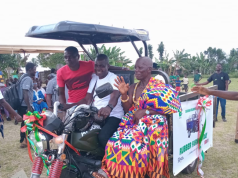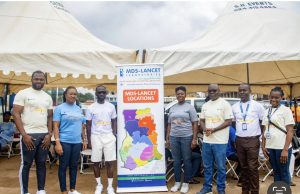By Godson Kofi DAVIES
A troubling rise in the incidence of kidney disease poses a significant public health challenge. With an increasing number of cases linked to hypertension and diabetes, the nation faces critical issues regarding treatment accessibility and the vital need for early detection.
The rising tide of kidney disease in Ghana
Recent studies suggest that kidney disease is becoming alarmingly prevalent in Ghana. It has been reported that approximately 10 percent of the population may suffer from some form of kidney damage, with many cases undiagnosed until they are advanced. Hypertension and diabetes, two major risk factors for kidney disease, are prevalent in the Ghanaian population, with prevalence rates climbing in recent years.
According to the International Diabetes Federation, diabetes prevalence in the adult population in Ghana was estimated at around 6 percent in 2021, while hypertension affects nearly 30 percent of adults.
Contributing factors
The surge in kidney disease correlates strongly with lifestyle changes associated with urbanisation. Increased consumption of processed foods high in salt and fat, coupled with sedentary lifestyles, contributes significantly to the rise in hypertension and diabetes, thereby escalating the risk of developing kidney disease. Additionally, the lack of adequate public health education on the importance of diet and exercise exacerbates the problem.
Challenges in treatment
Treating kidney disease is fraught with difficulties, including limited access to adequate healthcare facilities, the high cost of treatment, and a shortage of trained nephrologists. Dialysis and kidney transplants, the most common treatments for severe kidney disease, are not only costly but also not widely available. For many Ghanaians, the financial burden of kidney disease treatment is prohibitive.
The importance of early detection
Early detection of kidney disease can significantly enhance the effectiveness of treatment, slowing disease progression and improving outcomes. However, there is a widespread lack of awareness about kidney disease symptoms and a critical shortage of screening programmes in Ghana. One of the leading nephrologists in Accra emphasised the need for national health policies to focus on preventive measures. “We need to integrate kidney health into our routine health checks, especially for patients known to have diabetes or hypertension, to catch the disease before it reaches an advanced stage,” she advises.
Case studies highlighting the impact
Several case studies illustrate the severity of the situation:
- Case 1: John, a 45-year-old teacher, was diagnosed with kidney disease after years of uncontrolled hypertension. By the time of diagnosis, his options were limited to dialysis, a treatment he struggles to afford.
- Case 2: Abena, a 30-year-old diabetic, benefitted from an early screening programme that detected her kidney disease at a manageable stage, illustrating the life-saving potential of early detection and intervention.
- Case 3: Ebo, a 52-year-old farmer from a rural village near Kumasi, initially mistook his symptoms of fatigue and swollen ankles for signs of ageing or minor illness. Due to the lack of nearby medical facilities and his limited understanding of kidney disease, Ebo did not seek help until his condition worsened significantly. By the time he received a diagnosis, his kidney function was severely compromised, necessitating immediate dialysis. His case highlights the dire need for better healthcare infrastructure and education in rural areas.
- Case 4: Grace, a 38-year-old accountant in Accra, benefitted from her employer’s annual health screening that included kidney function tests. Elevated creatinine levels indicated early-stage kidney disease, likely caused by her untreated hypertension. Because her condition was identified early, Grace was able to manage her kidney health through medication and lifestyle changes, avoiding more severe interventions. This case demonstrates the lifesaving potential of regular health screenings and employer involvement in healthcare.
- Case 5: Samuel, a 28-year-old university student, experienced sudden onset of severe symptoms, including vomiting and weight loss, which led him to seek emergency medical attention. An acute kidney injury was diagnosed, linked to an overuse of over-the-counter painkillers for chronic headaches. Samuel’s recovery involved acute medical treatment and education about the dangers of self-medication. His experience underscores the importance of public education on the risks of common medications and their potential impact on kidney health.
These case studies collectively show the range of ways kidney disease can affect individuals and emphasise the critical nature of education, early detection and accessible healthcare to mitigate the growing kidney health crisis in Ghana. To combat the rising tide of kidney disease, Ghana must implement several key strategies:
- Enhanced public education: Increasing awareness about the risk factors and symptoms of kidney disease can encourage earlier diagnosis and treatment.
- Improved access to healthcare: Expanding the availability of affordable healthcare and increasing the number of trained nephrologists is crucial.
- National screening programmes: Implementing widespread screening for at-risk populations can significantly reduce the incidence of advanced kidney disease.
Dealing with kidney health crisis requires a multi-faceted approach that includes both government and community involvement. By focusing on prevention, early detection and the expansion of treatment options, Ghana can improve outcomes for individuals with kidney disease and reduce the overall burden on the healthcare system. The path forward is challenging but essential for the nation’s health.
Note: The views and opinions expressed in this article are those of the author and do not necessarily reflect the official policy or position of any organisation.
>>>I’ll be your wingman on your health journey! The writer is a public health professional with a Master’s degree from the University of Illinois at Springfield, USA and works as a Medical Fraud Analyst at the Illinois Office of Inspector-General. He founded GD Consult in Ghana to promote healthy lifestyles and developed innovative projects, such as a Health Risk Assessment Model for hydraulic fracking operations. He can be reached via [email protected]

















